29 jan 2018
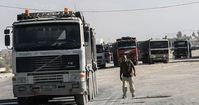
Israeli statistics have revealed that the number of trucks carrying goods to the Gaza Strip fell to 350 while Gaza is supposed to receive 800-1000 trucks per day.
Yedioth Ahronoth newspaper said that last week witnessed the lowest number of trucks entering Gaza daily via Karem Abu Salem crossing since the 2014 war.
The main reason for this drop, according to the Hebrew newspaper, is the decline in purchasing power in Gaza.
Another factor is the completion of the implementation of a long series of projects that came within the framework of the Gaza reconstruction campaign following the 2014 war. Those projects provided temporary sources of income for some citizens but they no longer exist.
The National Committee to Break the Siege on Gaza said that about 80% of Gaza's population depends on humanitarian assistance from international organizations, adding that the situation in Gaza is likely to further deteriorate because of the ban on relief convoys' entry into Gaza and the political harassment UNRWA is being subjected to.
Statistics say that 6 out of 10 families in Gaza suffer from food insecurity, and that more than 272,000 citizens, including 100,000 university graduates, are currently unemployed due to the blockade and the great destruction caused to Gaza's industrial facilities by the three Israeli wars on Gaza.
Yedioth Ahronoth newspaper said that last week witnessed the lowest number of trucks entering Gaza daily via Karem Abu Salem crossing since the 2014 war.
The main reason for this drop, according to the Hebrew newspaper, is the decline in purchasing power in Gaza.
Another factor is the completion of the implementation of a long series of projects that came within the framework of the Gaza reconstruction campaign following the 2014 war. Those projects provided temporary sources of income for some citizens but they no longer exist.
The National Committee to Break the Siege on Gaza said that about 80% of Gaza's population depends on humanitarian assistance from international organizations, adding that the situation in Gaza is likely to further deteriorate because of the ban on relief convoys' entry into Gaza and the political harassment UNRWA is being subjected to.
Statistics say that 6 out of 10 families in Gaza suffer from food insecurity, and that more than 272,000 citizens, including 100,000 university graduates, are currently unemployed due to the blockade and the great destruction caused to Gaza's industrial facilities by the three Israeli wars on Gaza.
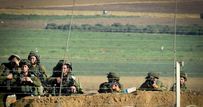
Israeli Occupation Forces (IOF) on Monday opened machinegun fire at Palestinian agricultural lands east of Rafah city south of the Gaza Strip.
The PIC reporter said that Israeli military watchtowers positioned east of Rafah targeted Gazan farmers while working in their farms in the area. However, no injuries were reported, according to medical sources.
Rafah farmers on Monday returned to work in their lands by the assistance of the International Committee of the Red Cross for the first day after being banned from farming in the eastern areas for 12 years.
The PIC reporter said that Israeli military watchtowers positioned east of Rafah targeted Gazan farmers while working in their farms in the area. However, no injuries were reported, according to medical sources.
Rafah farmers on Monday returned to work in their lands by the assistance of the International Committee of the Red Cross for the first day after being banned from farming in the eastern areas for 12 years.
28 jan 2018
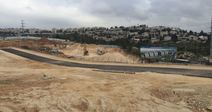
Israeli settlers Sunday razed agricultural land belonging to a Palestinian in the town of al-Khader, south of the southern West Bank district of Bethlehem, according to a local activist.
Ahmed Salah, a member of the local anti-settlement committee in Bethlehem, told WAFA settlers, from the illegal settlement of Eliezer, razed a four-dunum of land in an area to the west of al-Khader town.
The land belongs to a local resident who was identified as Mohmed Abu Samra.
The land owner, Abu Samra, said he was surprised to find settlers razing his land, stressing that he has recently managed to restore the land after being stolen by the settlers.
Ahmed Salah, a member of the local anti-settlement committee in Bethlehem, told WAFA settlers, from the illegal settlement of Eliezer, razed a four-dunum of land in an area to the west of al-Khader town.
The land belongs to a local resident who was identified as Mohmed Abu Samra.
The land owner, Abu Samra, said he was surprised to find settlers razing his land, stressing that he has recently managed to restore the land after being stolen by the settlers.
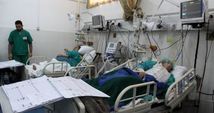
Gaza's Ministry of Health on Sunday warned that some hospitals might be shut down within hours due to the acute fuel shortage plaguing the besieged area.
Spokesman for the Ministry, Ashraf al-Qedra, said that a few hours from now health services will be halted in both Beit Hanoun hospital and al-Durra children's hospital.
Al-Qedra announced on 23rd January that the Palestinian Authority (PA) Minister of Health, Jawad Awwad, had decided to allocate one million shekels to supply Gaza's health facilities with fuel. However, al-Qedra added, the funds would cover the fuel consumed by these facilities in ten days only.
For his part, Hamas's spokesman Fawzi Barhoum said that the PA government's disregard for the Gaza hospitals' needs is a thinly veiled attempt to push Gaza toward collapse.
Barhoum, in a statement on his Facebook page, held the PA government responsible for the consequences of this crisis.
Ministry of Health said that it is facing a stifling power crisis that would adversely affect the provision of health services in the Gaza Strip.
It added that it has decided to operate smaller generators in its facilities and take a series of austerity measures to optimize the use of the available amount of fuel.
The Ministry explained that Gaza's health facilities need 450,000 liters of diesel per month when power outages last 8-12 hours a day. In the case of 20-hour outages, 950,000 liters are needed.
The cost of the fuel needed to cover a single hour of power outage is nearly $2,000, the Ministry noted.
Spokesman for the Ministry, Ashraf al-Qedra, said that a few hours from now health services will be halted in both Beit Hanoun hospital and al-Durra children's hospital.
Al-Qedra announced on 23rd January that the Palestinian Authority (PA) Minister of Health, Jawad Awwad, had decided to allocate one million shekels to supply Gaza's health facilities with fuel. However, al-Qedra added, the funds would cover the fuel consumed by these facilities in ten days only.
For his part, Hamas's spokesman Fawzi Barhoum said that the PA government's disregard for the Gaza hospitals' needs is a thinly veiled attempt to push Gaza toward collapse.
Barhoum, in a statement on his Facebook page, held the PA government responsible for the consequences of this crisis.
Ministry of Health said that it is facing a stifling power crisis that would adversely affect the provision of health services in the Gaza Strip.
It added that it has decided to operate smaller generators in its facilities and take a series of austerity measures to optimize the use of the available amount of fuel.
The Ministry explained that Gaza's health facilities need 450,000 liters of diesel per month when power outages last 8-12 hours a day. In the case of 20-hour outages, 950,000 liters are needed.
The cost of the fuel needed to cover a single hour of power outage is nearly $2,000, the Ministry noted.
24 jan 2018
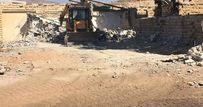
Israeli forces on Wednesday morning knocked down three residential barracks and a barn east of Nablus’s southern town of Akreba, in the northern occupied West Bank.
According to eye-witnesses, an Israeli bulldozer demolished three residential structures and a barn for raising livestock owned by the Palestinian citizen Zuheir Bani Menya.
Sometime earlier, the occupation authorities turned Zuheir’s agricultural structures—his sole sources of living—into rubble.
According to eye-witnesses, an Israeli bulldozer demolished three residential structures and a barn for raising livestock owned by the Palestinian citizen Zuheir Bani Menya.
Sometime earlier, the occupation authorities turned Zuheir’s agricultural structures—his sole sources of living—into rubble.
22 jan 2018

The Israeli occupation authorities on Monday issued orders to demolish and evacuate Palestinian structures in Bethlehem province.
Hasan Brijiyah, from the Popular Anti-Settlement Committee, said an Israeli patrol showed up in Khilet al-Nakhla and handed over a Palestinian family a notification to evacuate their land tract, covering an area of 45 dunums, after they declared it “state property”.
Another Palestinian citizen—Mohamed Ayesh—received an order to stop the construction of a water well on his land lot under the pretext of unlicensed construction.
Sometime earlier, an Israeli court confirmed Brijiya’s ownership of the land, after Israeli settlers tried to seize it, added Ayesh.
The activist warned of the swift pace of Israel’s demolition policies throughout the West Bank, which he said have been remarkably nurtured by the U.S. President Donald Trump’s recognition of Occupied Jerusalem as Israel’s capital, among other unilateral moves made at the expense of Palestinian rights.
Hasan Brijiyah, from the Popular Anti-Settlement Committee, said an Israeli patrol showed up in Khilet al-Nakhla and handed over a Palestinian family a notification to evacuate their land tract, covering an area of 45 dunums, after they declared it “state property”.
Another Palestinian citizen—Mohamed Ayesh—received an order to stop the construction of a water well on his land lot under the pretext of unlicensed construction.
Sometime earlier, an Israeli court confirmed Brijiya’s ownership of the land, after Israeli settlers tried to seize it, added Ayesh.
The activist warned of the swift pace of Israel’s demolition policies throughout the West Bank, which he said have been remarkably nurtured by the U.S. President Donald Trump’s recognition of Occupied Jerusalem as Israel’s capital, among other unilateral moves made at the expense of Palestinian rights.
21 jan 2018
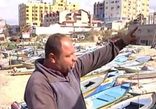
Israeli navy ships opened fire, on Sunday morning on several Palestinian fishing boats, in Gaza territorial waters, in the northern part of the coastal region.
Eyewitnesses said the soldiers fired dozens of live rounds, and chased the boats, forcing the fishermen back to shore, without being able to fish to provide for their families.
The attack is part of ongoing Israeli violations against the fishermen, and their boats, in addition to attacks against farmers and workers, on their lands, in several border areas, in the besieged Gaza Strip.
The attacks led to dozens of casualties, including fatalities, in addition to the abduction of fishermen, and the illegal confiscation of their boats, their only source of livelihood.
Eyewitnesses said the soldiers fired dozens of live rounds, and chased the boats, forcing the fishermen back to shore, without being able to fish to provide for their families.
The attack is part of ongoing Israeli violations against the fishermen, and their boats, in addition to attacks against farmers and workers, on their lands, in several border areas, in the besieged Gaza Strip.
The attacks led to dozens of casualties, including fatalities, in addition to the abduction of fishermen, and the illegal confiscation of their boats, their only source of livelihood.
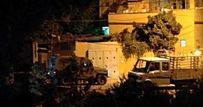
The Israeli Occupation Forces (IOF) arrested Sunday evening a Palestinian man and his 16-year-old boy in Khuder town south of Bethlehem.
Local sources said that Ahmed Mahmoud Salah, an activist in an anti-settlement committee, was detained along with his son Guvera, 16.
Earlier today, an Israeli settler attacked Palestinian shepherds in the Jordan Valley and forced them to leave their agricultural lands.
Similar settlers' attacks are carried out in nearly daily basis under IOF’s protection.
Local sources said that Ahmed Mahmoud Salah, an activist in an anti-settlement committee, was detained along with his son Guvera, 16.
Earlier today, an Israeli settler attacked Palestinian shepherds in the Jordan Valley and forced them to leave their agricultural lands.
Similar settlers' attacks are carried out in nearly daily basis under IOF’s protection.
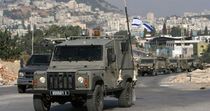
The Israeli occupation forces (IOF) on Sunday afternoon stormed Silat ad-Dhahr town, south of Jenin in the West Bank, and confiscated a number of security camera recordings.
Local sources told the Palestinian Information Center (PIC) that soldiers stormed the town, spread on its main street and raided commercial stores near the Jenin-Nablus road.
They added that the soldiers questioned several storekeepers and seized CCTV camera recordings from their stores.
Over the past two weeks, the IOF confiscated many CCTV recordings as part of its recent campaign to capture resistance fighters in the West Bank.
Local sources told the Palestinian Information Center (PIC) that soldiers stormed the town, spread on its main street and raided commercial stores near the Jenin-Nablus road.
They added that the soldiers questioned several storekeepers and seized CCTV camera recordings from their stores.
Over the past two weeks, the IOF confiscated many CCTV recordings as part of its recent campaign to capture resistance fighters in the West Bank.

The Israeli occupation forces (IOF) on Sunday morning detained Palestinian farmers in Kafr ad-Dik town, west of Salfit in the West Bank, as well as members of a media crew in a nearby area.
Palestine TV reporter Mohamed Ashtiya said that Israeli soldiers detained him for a while and confiscated his ID card, adding that he was along with a crew from the channel when soldiers intercepted their vehicle as they were heading for the town.
The TV crew was on its way to cover Israeli settlement expansion activities taking place on annexed land in Kafr ad-Dik town.
Palestine TV reporter Mohamed Ashtiya said that Israeli soldiers detained him for a while and confiscated his ID card, adding that he was along with a crew from the channel when soldiers intercepted their vehicle as they were heading for the town.
The TV crew was on its way to cover Israeli settlement expansion activities taking place on annexed land in Kafr ad-Dik town.
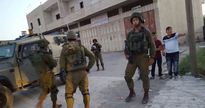
Israeli soldiers on Saturday attacked Palestinian farmers near the apartheid wall west of Salfit province with spates of bullet fire.
According to local sources, Israeli soldiers opened fire at Palestinian farmers west of Deir Balout town while they were working on their land tracts.
A Palestinian family targeted in the shooting said the attack has not been the only one of its kind as the occupation forces ceaselessly target farmers in the area in an attempt to force them out of their lands.
The Israeli army has stepped up shooting attacks against Palestinian farmers and civilians across the West Bank under the guise of attempting to rein in infiltrations into Palestinian territories occupied in 1948 (Israel) via separation fences.
According to local sources, Israeli soldiers opened fire at Palestinian farmers west of Deir Balout town while they were working on their land tracts.
A Palestinian family targeted in the shooting said the attack has not been the only one of its kind as the occupation forces ceaselessly target farmers in the area in an attempt to force them out of their lands.
The Israeli army has stepped up shooting attacks against Palestinian farmers and civilians across the West Bank under the guise of attempting to rein in infiltrations into Palestinian territories occupied in 1948 (Israel) via separation fences.
17 jan 2018

The Ministry of Health in Gaza commenced on Monday morning, implementing a series of tough austerity measures, to face the shortage of fuel and electricity within its facilities.
Health Ministry spokesperson Ashraf al-Qedra stated that the ministry has introduced a series of stern measures to confront the shortage of fuel and electricity, and will spare no effort to prolong its health services provided to Gazans.
Al-Qedra asserted that his ministry communicates with all bodies and organizations to contain the stifling crisis hitting its facilities.
Gaza’s hospitals need monthly an amount of some 630 liters of fuel, in case the electricity outage reaches 12 hours per a day.
The Gaza Ministry of Health appealed to all relevant bodies, organizations and the Palestinian government of National Consensus to urgently intervene, to save the health status inside the Gaza’s hospitals by supplying them the needed amount of fuel.
Health Ministry spokesperson Ashraf al-Qedra stated that the ministry has introduced a series of stern measures to confront the shortage of fuel and electricity, and will spare no effort to prolong its health services provided to Gazans.
Al-Qedra asserted that his ministry communicates with all bodies and organizations to contain the stifling crisis hitting its facilities.
Gaza’s hospitals need monthly an amount of some 630 liters of fuel, in case the electricity outage reaches 12 hours per a day.
The Gaza Ministry of Health appealed to all relevant bodies, organizations and the Palestinian government of National Consensus to urgently intervene, to save the health status inside the Gaza’s hospitals by supplying them the needed amount of fuel.
16 jan 2018
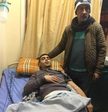
Israeli soldiers invaded, on Monday at night, Burqin town, west of the northern West Bank city of Jenin, searched many homes and buildings, and injured five young men.
Media sources in Jenin said the soldiers fired many live rounds, rubber-coated steel bullets and gas bombs, at many protesters, who hurled stones at the invading armored jeeps.
The soldiers shot four Palestinians with rubber-coated steel bullets, and one with a live round in his leg, in addition to causing many others to suffer the effects of teargas inhalation.
The sources added that the soldiers invaded and ransacked homes, a local company, a supermarket and a gas station, before confiscating surveillance recordings.
Eyewitnesses said the soldiers caused damage to many vehicles, including two cars owned Wisam Thieb Affana, and Kanaan Company, in addition to a tractor owned by Siyam al-‘Aassi.
On Monday evening, the soldiers invaded the al-Walaja village, northwest of Bethlehem, and photographed three homes In Ein Jweiza area.
It is worth mentioning that Ein Jweiza is subject to frequent invasions, while many Palestinians received demolition orders of their homes, or orders demanding them to stop the construction, as the army is trying to illegally confiscate the lands for “military purposes,” and for expanding illegal colonies.
Media sources in Jenin said the soldiers fired many live rounds, rubber-coated steel bullets and gas bombs, at many protesters, who hurled stones at the invading armored jeeps.
The soldiers shot four Palestinians with rubber-coated steel bullets, and one with a live round in his leg, in addition to causing many others to suffer the effects of teargas inhalation.
The sources added that the soldiers invaded and ransacked homes, a local company, a supermarket and a gas station, before confiscating surveillance recordings.
Eyewitnesses said the soldiers caused damage to many vehicles, including two cars owned Wisam Thieb Affana, and Kanaan Company, in addition to a tractor owned by Siyam al-‘Aassi.
On Monday evening, the soldiers invaded the al-Walaja village, northwest of Bethlehem, and photographed three homes In Ein Jweiza area.
It is worth mentioning that Ein Jweiza is subject to frequent invasions, while many Palestinians received demolition orders of their homes, or orders demanding them to stop the construction, as the army is trying to illegally confiscate the lands for “military purposes,” and for expanding illegal colonies.
15 jan 2018

Israeli daily Haaretz, on Monday, reported that Israeli military officials have acknowledged that the Palestinian situation is deteriorating, and that the economy and infrastructure in Gaza was “from zero to below zero.”
Haaretz said, according to the PNN, that Israeli politicians were acting as if military pressure can continue on Gaza, ignoring the worsening economic situation in the Strip.
“In the long term, continually deteriorating infrastructure brings the risk of an uncontrollable blow-up in the Strip,” the daily said.
This deterioration is noticed through the number of trucks crossing the Karm Abu Salem crossing between Gaza and Israel that has dropped by half, due to the decline in the purchasing power of the Palestinians living in Gaza.
The report also said that about 95 percent of Gaza’s water was undrinkable and that unemployment was inching toward 50 percent and was even higher among young people.
Haaretz said, according to the PNN, that Israeli politicians were acting as if military pressure can continue on Gaza, ignoring the worsening economic situation in the Strip.
“In the long term, continually deteriorating infrastructure brings the risk of an uncontrollable blow-up in the Strip,” the daily said.
This deterioration is noticed through the number of trucks crossing the Karm Abu Salem crossing between Gaza and Israel that has dropped by half, due to the decline in the purchasing power of the Palestinians living in Gaza.
The report also said that about 95 percent of Gaza’s water was undrinkable and that unemployment was inching toward 50 percent and was even higher among young people.
14 jan 2018
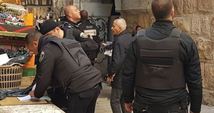
Israeli municipal staff and policemen on Sunday seized Palestinian stalls and fined street vendors near al-Majlis Gates, one of the entrance doors to Jerusalem’s al-Aqsa Mosque.
Media coordinator at the Islamic Endowment Department Firas al-Dabs said Israeli police seized stalls set up near al-Majlis Gate and subjected Palestinian sellers to steep fines.
Al-Dabs said the measures make part of preplanned crackdowns by the Israeli occupation authorities in an attempt to force Palestinians out of Occupied Jerusalem.
Media coordinator at the Islamic Endowment Department Firas al-Dabs said Israeli police seized stalls set up near al-Majlis Gate and subjected Palestinian sellers to steep fines.
Al-Dabs said the measures make part of preplanned crackdowns by the Israeli occupation authorities in an attempt to force Palestinians out of Occupied Jerusalem.
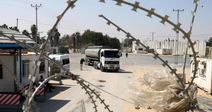
The Israeli occupation authorities on Sunday decided to close Karem Abu Salem crossing, southeast of Rafah city in the southern Gaza Strip, until further notice.
The closure followed Israeli air strikes launched east of Rafah near the border crossing.
Karem Abu Salem is the sole outlet through which goods are brought into the besieged Gaza Strip. The Israeli authorities usually close the crossing on Fridays and Saturdays and during Jewish holidays.
The Israeli occupation army announced later on Sunday that it had destroyed a Hamas tunnel running from Gaza into the 1948 occupied Palestinian territories.
Israeli army spokesman claimed that the destroyed tunnel, which passes under Karem Abu Salem, is 1.5 km long.
The closure followed Israeli air strikes launched east of Rafah near the border crossing.
Karem Abu Salem is the sole outlet through which goods are brought into the besieged Gaza Strip. The Israeli authorities usually close the crossing on Fridays and Saturdays and during Jewish holidays.
The Israeli occupation army announced later on Sunday that it had destroyed a Hamas tunnel running from Gaza into the 1948 occupied Palestinian territories.
Israeli army spokesman claimed that the destroyed tunnel, which passes under Karem Abu Salem, is 1.5 km long.

An elderly couple using a charcoal grill to heat their house, in Gaza, was found dead on Sunday afternoon, the Palestinian Ministry of Health said.
A Health Ministry spokesperson said that the man, who was 90 years old and his wife 88 years old, used the charcoal grill to heat their house due to the lack of electricity.
According to Days of Palestine, the spokesperson said that using the charcoal grill in a bad ventilation system causes carbon monoxide poisoning.
Gazans have been suffering during winter due to the inability to warm up the homes because of the lack of electricity, which is an integral part of the 11-year-old siege implemented and sustained by Israel, Egypt and the Palestinian Authority.
A Health Ministry spokesperson said that the man, who was 90 years old and his wife 88 years old, used the charcoal grill to heat their house due to the lack of electricity.
According to Days of Palestine, the spokesperson said that using the charcoal grill in a bad ventilation system causes carbon monoxide poisoning.
Gazans have been suffering during winter due to the inability to warm up the homes because of the lack of electricity, which is an integral part of the 11-year-old siege implemented and sustained by Israel, Egypt and the Palestinian Authority.

The Palestinian healthcare system in the besieged Gaza Strip is facing an alarming crisis due to the shortage of fuel supplies for generators that provide power for hospitals, a spokesman for the Palestinian Ministry of Health in Gaza has warned.
Health Ministry spokesman, Ashraf al-Qidrah, said the ministry has enacted a “Plan B” which involves the redistribution of resources to more critically needed health assets.
Al-Qidrah also warned of the possibility of delayed or canceled surgeries and inter-hospital transfers if no urgent action is taken on the part of the concerned authorities.
He said patients with severe illnesses and those diagnosed with renal failure are at risk of losing their lives as a result of the crisis.
He added that the health system’s fuel reserves will completely run out by mid February and if a solution is not found, Gaza’s hospitals will be forced to close essential services.
Over recent years, increasing shortages of fuel have created a real crisis for Gaza’s hospitals, often leading to the closure of essential health services, thus, leaving thousands of patients without access to life-saving health care.
Health Ministry spokesman, Ashraf al-Qidrah, said the ministry has enacted a “Plan B” which involves the redistribution of resources to more critically needed health assets.
Al-Qidrah also warned of the possibility of delayed or canceled surgeries and inter-hospital transfers if no urgent action is taken on the part of the concerned authorities.
He said patients with severe illnesses and those diagnosed with renal failure are at risk of losing their lives as a result of the crisis.
He added that the health system’s fuel reserves will completely run out by mid February and if a solution is not found, Gaza’s hospitals will be forced to close essential services.
Over recent years, increasing shortages of fuel have created a real crisis for Gaza’s hospitals, often leading to the closure of essential health services, thus, leaving thousands of patients without access to life-saving health care.
13 jan 2018
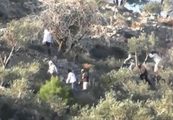
A group of extremist Israeli colonists, illegally living on stolen Palestinian lands in Huwwara and Burin villages, south of the northern West Bank city of Nablus, have cut Saturday more than 110 olive trees, owned by several Palestinians, while Israeli soldiers watched without trying to stop them.
The colonists came from the illegal Yitzhar outpost, which was installed on private Palestinian lands in Huwwara and Burin.
They cut and destroyed more than 110 Palestinian Olive Trees, owned by several Palestinians, before the locals intercepted their attack, and managed to force them out.
A video, filmed by a local Palestinian shows the colonists cutting the trees, while Israeli soldiers stood on top of a small hill, watching them without even trying to stop them.
There have been numerous previous incidents where the soldiers only intervened to attack the Palestinians, and fire at them, when the rushed to rescue their lands, their main and in most cases, their only source of livelihood, and clashed with the invading illegal colonists.
The colonists came from the illegal Yitzhar outpost, which was installed on private Palestinian lands in Huwwara and Burin.
They cut and destroyed more than 110 Palestinian Olive Trees, owned by several Palestinians, before the locals intercepted their attack, and managed to force them out.
A video, filmed by a local Palestinian shows the colonists cutting the trees, while Israeli soldiers stood on top of a small hill, watching them without even trying to stop them.
There have been numerous previous incidents where the soldiers only intervened to attack the Palestinians, and fire at them, when the rushed to rescue their lands, their main and in most cases, their only source of livelihood, and clashed with the invading illegal colonists.
12 jan 2018

The Israeli Occupation Forces (IOF) closed Friday evening al-Dilba spring in Fawar refugee camp south of al-Khalil.
According to the PIC reporter, IOF closed the road leading to al-Dilba spring north of the camp, preventing local farmers from approaching it.
This came as part of Israeli daily restrictions on Palestinian residents in al-Fawar camp.
According to the PIC reporter, IOF closed the road leading to al-Dilba spring north of the camp, preventing local farmers from approaching it.
This came as part of Israeli daily restrictions on Palestinian residents in al-Fawar camp.
